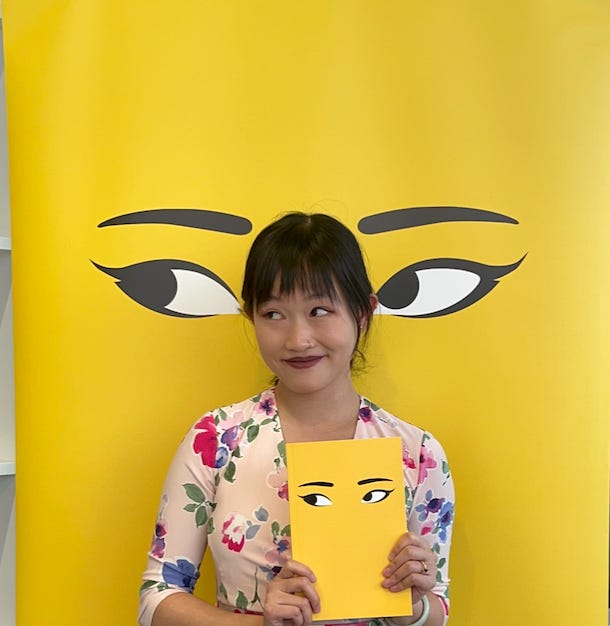who gets to be authentic anyways?
everyone who has ever given me an extra wordcount has always regretted it
Dear readers,
The thing I like about doing special editions of my work for Barnes & Noble is that they always let me write whatever I want for the exclusive content, and I always want to write an annotated bibliography, and they always roll their eyes and let me get on with it. The Yellowface special edition has an essay titled “Asian American Literary Identity and Representation: A Personal Tour of the Field,” and it’s basically several pages of me walking you through the scholarship that informs how I think about cultural appropriation, yellowface, and who should write what. I really shouldn’t replicate the entire essay here, but I wanted to share some of the questions I was thinking about…
First, instead of thinking in strict terms of who “gets to” or “has permission” to write what sorts of stories (a framework I find increasingly unhelpful), I want to interogate the relationship between representation, profit, and the creation of stereotypes:
Long before white actors were donning yellow masks, the “visual language of yellowface was a source of fascination, derision, and envy in early America. Though this book’s focus predates Yellowface quite a bit, John Kuo Wei Tchen’s New York Before Chinatown (1999) traces orientalist perceptions of China and the Chinese from the late eighteenth to mid-nineteenth centuries in America. Yellowface argues that in the publishing industry, being “BIPOC” can be a commodifying and restraining just easily as it is empowering; meanwhile Tchen’s text examines earlier instances of the commodification of racial spectacle and stereotype: as freak, as garish, as other. The “Chinese Lady” Afong Moy, the “Siamese Twins” Chang and Eng, and PT Barnum’s “Chinese Family” were displayed, gawked at, exploited, and invested with a universe of symbolic meaning reflecting what Americans thought of exotic China. For Chinese Americans, racialization and spectacle go hand in hand–but who, ultimately, serves to profit from such orientalist displays?
Second, I wanted to sit a little with what we mean by “authenticity.” This word gets thrown around a lot in Asian American cultural criticism – this movie wasn’t authentic enough, this book was good because it was authentic – and I find often it stands as a shorthand for the “right” kind of ethnic presentation. I’ve been inspired academically and creatively by Tina Chen’s work, which challenges us to think about Chinese American identity in terms of impersonation rather than imposure; as fluid and negotiatable rather than rigidly authentic (or not):
How else can we break down notions of authenticity? I came across Tina Chen’s Double Agency (2005) last semester in a directed reading course, and it has since helped me articulate some of what I was trying to express in Yellowface. Chen argues very basically that a politics of impersonation has always been crucial to Chinese American praxis, for we have always been suspected of being spies, double agents, perpetual foreigners – not real Americans. Through a politics of impersonation–that is, “a performance of divided allegiance that simultaneously pays homage to and challenges authenticity and authority” (Chen xvii) – Chen encourages to break down the divisions between truth and fiction, the real and the fake, authenticity and imposture, and the mask and the wearer. Of course, Yellowface is prima facie about June’s blatant impersonation. But it is worth asking: who is Athena impersonating? Rather, what kind of Asian is she performing? A cultural broker? A model minority? I’ve also found Chen’s analysis of stereotypes very useful for what I’ve tried to do by narrating Yellowface through June’s perspective. Can we derive anything useful from racist stereotypes aside from the knee-jerk reaction, “Well this is awful”? Perhaps, if we leaned into them, could we realize that stereotypes often reveal more about the anxieties of dominant groups more than they explain anything about their targets?
I think doing Asian American studies just means spending a lot of your time tortured over the problem of authenticity. Small wonder I spent so much of Yellowface writing about lies, ghosts, stolen voices, and many different sides of the same story…
Thanks always for following me down these rabbitholes. The full version is printed in the back of the B&N edition, which now up for preorder here.
Signing off with a photo: here’s me being silly at my publisher’s offices in London last week :)
Love,
Rebecca





Barnes & Noble may roll their eyes, but I was really excited to learn about the annotated bibliography in the Yellowface special edition! My reaction can't *possibly* have anything to do with being a fellow grad student... /s. I was wondering: will the the essay be published anywhere else? I plan to purchase the special edition regardless, but it would be great to know if the essay will be accessible elsewhere as well. Looking forward to reading it!
P.S. Would I be correct in understanding that both the "BN Exclusive" and "Signed Book" editions on the B&N website contain the essay? Or is it the former only?
Just finished my Yellowface ARC - most visceral reaction I’ve had from a book in a long, long time. My hands were actually physically shaking by the end. Seeing this in my inbox was such a treat; I’m exicted to read the bibliography when it comes out! Haven’t really processed it all yet but when the issue of authenticity is brought up people are never telling you what a story is meant to be authentic /to/. There is hardly a single model for hyphenated American experience. I think the problem is the fact that there’s so little space reserved for people of color in publishing, and that makes it seem like there /has/ to be that one perfect model to represent every single Asian American or other marginalized narrative ever. Because they only ever have the space for /one/ narrative. Thank you so much for sharing!